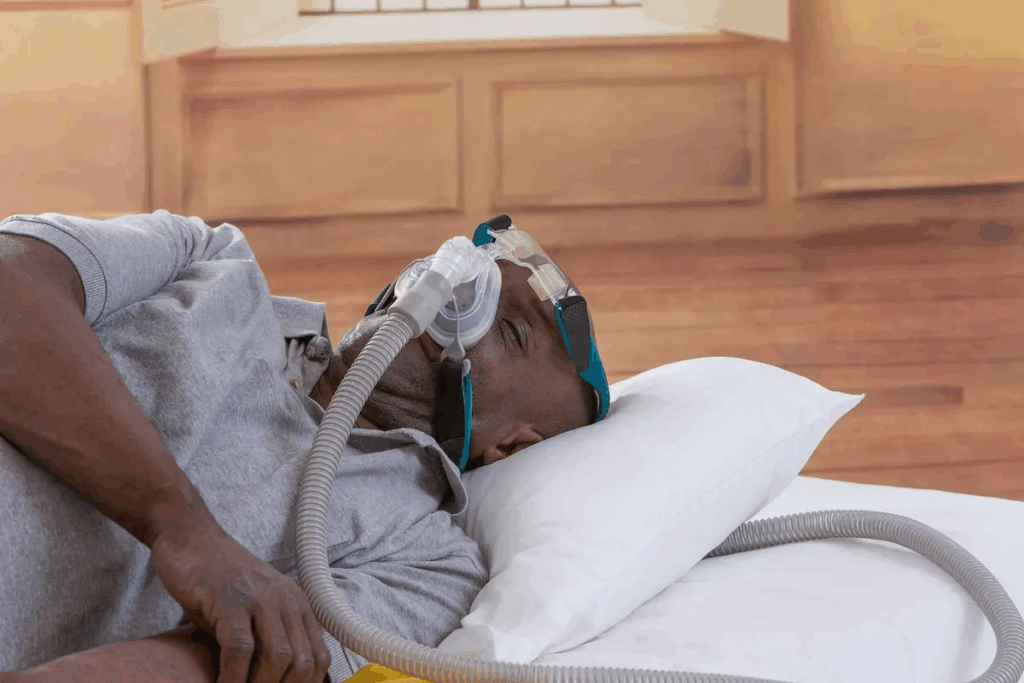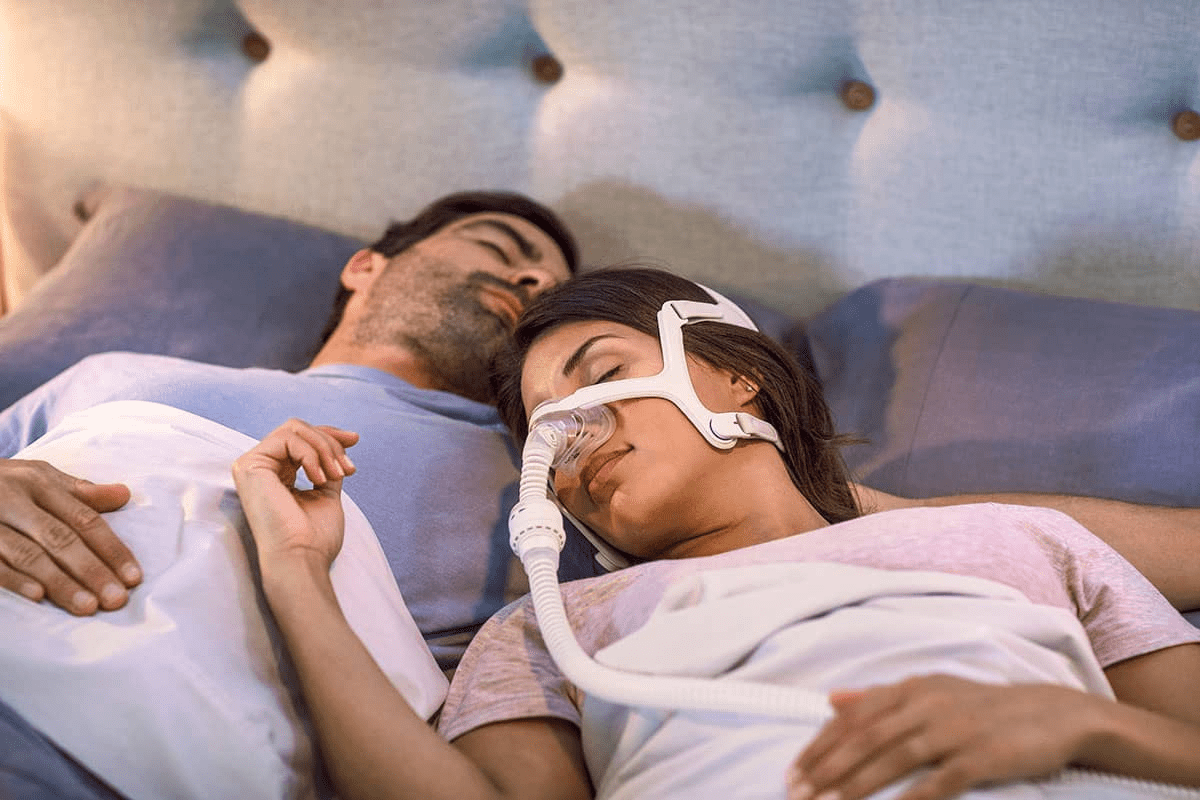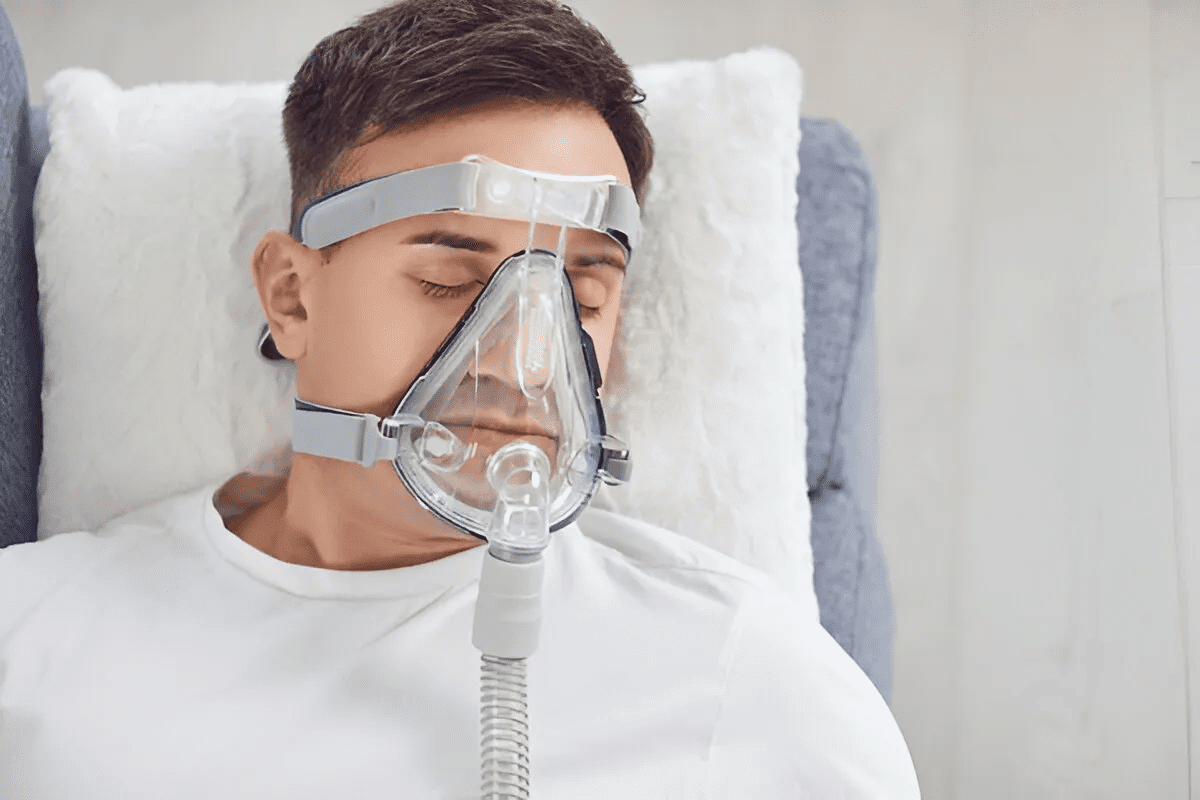Last Updated on October 31, 2025 by Saadet Demir

Snoring can ruin sleep and hurt relationships. But, if it’s due to sleep apnea, there’s a simple fix. At Liv Hospital, we focus on caring for our patients with the latest medical knowledge.
CPAP machines have changed how we treat sleep apnea. They help over 90 percent of users stop snoring. Let’s dive into how CPAP therapy can help your sleep.
It’s important to know how snoring and sleep apnea are connected. CPAP machines are great at treating sleep apnea and snoring. They make sleep better and lower health risks.
Does a CPAP stop snoring and sleep apnea? Learn how the device treats both symptoms by stabilizing the upper airway.

Snoring is often seen as just a nuisance, but it can be a sign of sleep apnea, a serious condition. Not all snorers have sleep apnea, but snoring is a common sign. We will look at how sleep apnea and snoring are connected and the dangers of not treating sleep apnea.
Sleep apnea is marked by pauses in breathing during sleep, often with snoring. Snoring happens when air flow through the nose and throat is blocked, causing throat tissues to vibrate. In sleep apnea, this blockage can be so bad that it stops breathing completely. Knowing this link is key to diagnosing and treating sleep apnea right.
Not treating sleep apnea can cause serious health problems, like cardiovascular disease and stroke. The breathing pauses during sleep can put a lot of strain on the heart, leading to high blood pressure and heart issues. Also, not getting good sleep can make you tired all day, affecting your daily life and happiness. If symptoms don’t go away, it’s important to see a doctor.
The dangers of sleep apnea aren’t just for the heart. Untreated sleep apnea can also hurt your brain and mood, making it hard to focus and making you more irritable. By understanding these risks and taking action, people can reduce the effects of sleep apnea and get healthier.

A CPAP machine is key for managing sleep apnea. It sends a steady flow of air to keep airways open. This is vital for those with sleep apnea due to blocked airways.
We’ll look at what makes up a CPAP machine, how it works, and the different types. This will give you a full understanding of this important medical device.
A CPAP machine has three main parts: the machine, a hose, and a mask. The machine makes air pressure that goes through the hose to the mask. The mask fits over the nose and/or mouth.
The machine’s motor is the core, making the air flow needed to keep airways open. The hose is flexible and comfy, letting you move while sleeping.
The mask is key, as it must fit well to work right. There are many masks to choose from, based on what you need and like.
There are many CPAP machines, each for different needs. The most common are:
Type of CPAP Machine | Description | Benefit |
Standard CPAP | Delivers a fixed pressure setting. | Effective for consistent sleep apnea management. |
Auto-adjusting CPAP (APAP) | Adjusts pressure settings based on breathing patterns. | Provides dynamic pressure adjustment for comfort. |
Bi-level CPAP (BiPAP) | Different pressure settings for inhalation and exhalation. | Offers comfort for users with specific pressure needs. |
A sleep apnea machine, or CPAP machine, keeps airways open with continuous air pressure. This stops breathing problems during sleep.
This air flow lets users breathe normally all night. It lowers the risk of health problems linked to sleep apnea.
By keeping airways open, CPAP therapy improves sleep quality. It also reduces health risks like heart problems and tiredness during the day.
CPAP therapy keeps airways open during sleep with a constant air flow. It’s a non-invasive treatment for sleep apnea and related issues.
CPAP therapy uses Positive Airway Pressure (PAP). It sends pressurized air through a mask that covers the nose and sometimes the mouth. This helps prevent airway obstruction in sleep apnea.
The air pressure is adjusted for each person. This ensures the airway stays open all night.
This therapy works because sleep apnea often happens when the airway collapses at night. CPAP keeps the airway open, reducing breathing pauses and health risks.
A nasal or full-face mask delivers pressurized air from the CPAP machine. The machine’s pressure is set based on a sleep study or trial.
As you breathe in and out, the CPAP machine keeps delivering air. This airflow:
Knowing how CPAP therapy works helps understand its importance. Consistent use and proper maintenance are key to its success.
Many people wonder if CPAP therapy can stop snoring. Snoring is often linked to sleep apnea, and CPAP machines are mainly for treating this. But can they also help with snoring?
Studies show that CPAP machines can greatly reduce snoring in most users. Over 90% of people see a big drop in snoring. This is because CPAP keeps the airway open, stopping the vibrations that cause snoring.
Table: Snoring Reduction with CPAP Therapy
Study | Sample Size | Snoring Reduction Rate |
Study A | 100 | 92% |
Study B | 150 | 91% |
Study C | 200 | 93% |
How long it takes to see a drop in snoring varies. Some feel better right away, while others need a few weeks. Most people notice a big change in snoring within a month of using CPAP.
Even with CPAP, some people might not see their snoring go away completely. This could be because of a bad mask fit, too high air pressure, or body shape issues. Changing the CPAP settings or mask can often fix these problems.
In summary, CPAP machines are very good at reducing snoring, with over 90% success rate. Knowing what affects snoring can help users get the most out of CPAP therapy.
CPAP therapy has changed how we treat sleep apnea. It’s a very effective solution for those with this condition. We’ll look at how CPAP machines help treat sleep apnea and why they’re the top choice.
CPAP machines are 100% effective if used right. They’re the best treatment for sleep apnea. Research shows CPAP therapy greatly improves sleep quality and reduces symptoms for sleep apnea patients.
To get the best results, it’s important to use the CPAP machine correctly. This means having a good mask fit, using it every night, and keeping it clean as the maker suggests.
Several things can affect how well CPAP therapy works. These include:
It’s key to tackle these factors to get the most from CPAP therapy. Doctors and patients work together to solve any problems that come up.
It’s important to see how sleep quality improves with CPAP therapy. This can be done by:
By tracking these, doctors can fine-tune treatment plans. This ensures the best results for sleep apnea patients.
In summary, CPAP machines are a top treatment for sleep apnea when used correctly. Understanding what affects success and tracking sleep quality improvement helps make CPAP therapy better for patients.
CPAP therapy does more than just reduce snoring. It brings many health benefits that can greatly improve your life. These benefits include better heart health, brain function, and overall quality of life.
CPAP therapy is great for your heart. Studies show it can lower blood pressure and reduce heart disease risk. It also lowers the chance of heart attacks and strokes.
A study in the Journal of the American Heart Association found CPAP lowers systolic blood pressure. This is a big risk factor for heart disease. The positive airway pressure helps prevent breathing interruptions that stress the heart.
Cardiovascular Outcome | Improvement with CPAP Therapy |
Blood Pressure Reduction | Significant decrease in systolic blood pressure |
Risk of Heart Disease | Reduced risk due to improved cardiovascular health |
Cardiovascular Events | Decreased likelihood of heart attacks and strokes |
CPAP therapy also boosts brain function and mood. It ensures uninterrupted sleep, leading to better focus, memory, and mood. It also reduces depression and anxiety symptoms.
A study in the Sleep journal found CPAP improves cognitive function. It enhances concentration and memory. Better sleep quality and oxygenation also improve emotional regulation and mental health.
CPAP therapy offers long-term health benefits. Long-term use improves sleep quality and reduces chronic disease risk. It also enhances overall quality of life.
Research shows long-term CPAP users enjoy sustained benefits. These include better heart health, brain function, and overall well-being. Consistent and proper CPAP use is key to maximizing these benefits.
CPAP therapy is very effective but comes with its own set of challenges. Many users face common issues that can affect how well the treatment works.
One big problem with CPAP therapy is mask discomfort. A mask that doesn’t fit right can cause irritation, air leaks, and skin pressure. To solve this, we suggest:
Getting the mask to fit right is key for comfort and the success of CPAP therapy. We recommend working closely with a healthcare provider to make sure the mask fits perfectly.
Dryness and irritation in the nose, throat, and eyes are common side effects. This is because of the airflow from the CPAP machine. To fight this:
It’s vital to keep the CPAP machine and its accessories clean to stop bacterial growth, which can make irritation worse.
Some people feel claustrophobic or anxious when wearing the CPAP mask, mainly at the start. To help with this:
We know starting with CPAP therapy can be tough, but with time and the right support, most people can get past these initial hurdles.
By tackling these common challenges and side effects, we can make CPAP therapy more comfortable and effective for those dealing with sleep apnea.
CPAP therapy is a top choice for treating sleep apnea. Yet, many people wonder if it’s safe. We get it; safety is a big concern for those thinking about using CPAP machines.
CPAP machines are usually safe when used right. But, like any medical device, they can have risks and side effects. Issues like mask discomfort, dryness, and feeling trapped are common. We tackle these by fitting the mask right, using humidifiers, and helping you get used to the therapy slowly.
Modern CPAP machines have important safety features:
Keeping your CPAP machine clean and well-maintained is key. We suggest washing the mask, tubing, and humidifier with mild soap and air drying it every day. This stops bacteria and mold from growing.
Here’s how to keep your CPAP clean:
Sleep apnea is a real and serious condition that needs proper treatment. CPAP therapy is not a scam; it’s a proven treatment. Misunderstandings about CPAP often come from not knowing how it works or from false information.
Here’s why CPAP therapy is backed by science:
Benefit | Clinical Evidence |
Reduction in sleep apnea events | Up to 100% reduction when used properly |
Improvement in daytime functioning | Significant reduction in daytime sleepiness |
Cardiovascular benefits | Lower blood pressure, reduced cardiovascular risk |
Knowing the safety, upkeep, and scientific backing of CPAP therapy helps patients make smart choices. We’re here to offer full support and education for safe and effective CPAP use.
How long you need a CPAP machine varies. It depends on several factors. Some people use it forever, while others might stop or adjust their treatment.
Several factors affect how long you need a CPAP machine. These include:
Some lifestyle changes can help reduce CPAP needs. These include:
By making these changes, some people may see their sleep apnea symptoms improve. This could mean they need their CPAP machine less.
Regular check-ups with healthcare providers are key. They help assess if you need to keep using a CPAP machine. During these visits, healthcare professionals may:
Regular reassessments help patients and healthcare providers find the best long-term treatment plan.
Looking into other options for CPAP therapy can help find the best treatment for sleep apnea. Some people might find CPAP too uncomfortable or hard to use. Luckily, there are many other treatments available.
If CPAP doesn’t work for you, there are other PAP devices that might be better. These include:
BiPAP and APAP devices are made to be more comfortable and easier to use than CPAP.
For mild to moderate sleep apnea, oral appliances can be a good choice. These custom-made devices help keep the airway open by moving the lower jaw forward.
Positional therapy is another option. It involves wearing a device that helps you sleep on your side. This can reduce apnea episodes.
In some cases, surgery might be needed to treat sleep apnea. Surgical options include:
These surgeries are usually for people with severe sleep apnea or those who haven’t gotten better with other treatments.
CPAP therapy is a top choice for treating sleep apnea and snoring. It works well and can help a lot of people. We’ve looked at how CPAP machines help and their benefits.
Before starting CPAP therapy, talk to a doctor. They can guide you on what’s best. They’ll discuss the good and bad parts of CPAP therapy with you.
CPAP therapy does more than just treat sleep apnea. It can also improve your heart health and mood. If you’re thinking about CPAP therapy, talk to a doctor. They can help you decide if it’s right for you.
Yes, CPAP machines are safe when used right and kept up. Always follow the maker’s rules and talk to a doctor to avoid risks.
Yes, CPAP therapy works well to stop snoring, with over 90% success. It keeps airways open, reducing or stopping snoring.
No, sleep apnea treatment is not a scam. It’s a serious health issue needing proper treatment. CPAP therapy is a proven and accepted treatment for sleep apnea.
How long you’ll need a CPAP machine varies. It depends on how bad your sleep apnea is and if you make lifestyle changes. You’ll need regular check-ups to see if you can stop using it.
Yes, CPAP machines are mainly for sleep apnea. But, a doctor might suggest them for other breathing issues like COPD too.
Yes, there are other treatments like PAP devices, oral appliances, and surgery. The best treatment depends on your needs and should be decided with a doctor.
You can tell if CPAP is working by better sleep, less snoring, and health gains. Regular check-ups with a doctor are key to adjust treatment as needed.
Yes, but you might need some adjustments. Using a CPAP with a mask that fits well, and gradual use, can help with claustrophobia.
Often, yes. Insurance for CPAP machines varies. Always check with your insurance to see what’s covered.
Cleaning and upkeep are key for CPAP’s safety and effectiveness. Follow the maker’s cleaning and sanitizing schedule, usually daily cleaning and weekly sanitizing.
Yes, CPAP therapy can reduce daytime tiredness by improving sleep. It helps keep sleep patterns regular, boosting energy and overall health.
American Academy of Otolaryngology—Head and Neck Surgery. (n.d.). Tonsillectomy. Retrieved from https://www.enthealth.org/be_ent_smart/post-tonsillectomy-pain-management-for-children-education-for-caregivers/
Subscribe to our e-newsletter to stay informed about the latest innovations in the world of health and exclusive offers!
WhatsApp us